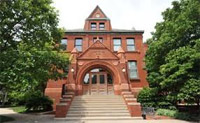Architecture, College of

Masters in Architecture Program: Theses
First Advisor
Peter Olshavsky
Date of this Version
5-2021
Document Type
Thesis
Abstract
This thesis explores the concept of queer space in architecture to understand its relationship between queer social narratives and their impact on spatial conditions. LGBTQ culture is a complex mix of avant-garde character aesthetics contrasted with hidden, invisible identity traits. By exploring queer figures and spaces through the lens of "camp," we can begin to see sexuality and gender’s impacts on objects and space. I argue that queer space is critical in shaping LGBTQ individuals’ narratives by bringing their struggles, celebrations, and what it is to be queer to the forefront of the urban landscape.
This is approached is by studying Chicago’s built environment and its LGBTQ community. We can see queer space as an atmosphere defined by the stories enmeshed within these spaces. Through the avant-garde lens of “camp,” my design exploration sprinkles queer spaces throughout the urban landscape to create vibrant moments, evoking glimmers of connection to emotional stories of LGBTQ figures and events that have often been overlooked. As you flip through this anthology of seven projects, each one offers a new form of queerness in space, representation, or narrative. Each design exploration comes from sampling quotes, interviews, social media, and other contemporary sources to extract LGBTQ narratives. The stories are then abstracted into architectural forms in varying degrees of scale, program, and representation. Like glitter, these projects are sprinkled throughout the urban landscape and activate the sites they occupy. They serve to draw people to them, stand in silent solidarity with them, or actively disrupt them.
Advisor: Peter Olshavsky


Comments
A design thesis Presented to the Faculty of The College of Architecture at the University of Nebraska In Partial Fullfillment of Requirements For the Degree of Master of Architecture, Major: Architecture, Under the Supervision of Professor Peter Olshavsky. Lincoln, Nebraska: May 2021
Copyright © 2021 WILLIAM DENDINGER III